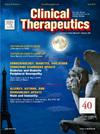Access to EU-Authorized Nonreimbursed Anticancer Medicines: An Explorative Survey Among Dutch Medical Oncologists
IF 3.6
4区 医学
Q2 PHARMACOLOGY & PHARMACY
引用次数: 0
Abstract
Purpose
Timelines for market authorization and reimbursement for anticancer medicines differ across European countries. Therefore, medical oncologists may face periods when promising anticancer medicines are not reimbursed, prompting ethical concerns about equitable access, particularly in publicly funded healthcare systems, such as the Netherlands. This study explores Dutch medical oncologists’ experiences and moral perspectives regarding access to EU-authorized nonreimbursed anticancer medicines and assesses practice variation.
Methods
A survey targeted 378 Dutch medical oncologists from all hospitals to explore their experiences, perspectives, and perceived responsibilities, as well as hospital policies regarding nonreimbursed EU-authorized anticancer medicines and their opinions on out-of-pocket payments and information provision.
Findings
Responses were provided by 132 medical oncologists (response rate of 34.9%), with 104 (78.8%) reporting that they sought access to nonreimbursed medicines in the past three years for one or more patients, primarily through manufacturer-funded “free-of-charge” programs (n = 77/104; 74,0%), clinical trials referral (n = 46/104; 44.2%) or clinical trials at their own hospital (n = 45/104; 43.3%), insurance leniency (n = 45/104; 43.3%), or the Dutch Drug Access Protocol (n = 42/104; 40.4%). While 48.5% felt responsible for seeking access to nonreimbursed medicines, 40.9% did not. Respondents mentioned different hospital policies on drug access. In the past three years, 69.5% (n = 91/131) of respondents had received patient inquiries about out-of-pocket (OOP) payment, but only 3.1% (n = 4/131) had actually prescribed OOP financed medicines. Fewer than half of the respondents (44.7%; n = 59/132) informed patients about nonreimbursed treatment options. Oncologists expressed strong concerns about financial toxicity, inequities in access, and threats to solidarity-based health care.
Implications
The majority of Dutch medical oncologists encounter EU-authorized, nonreimbursed anticancer medicines and report substantial variation in related practices and ethical views. In the absence of a national access framework, availability often depends on individual physicians, leading to potential inequities. National regulation is recommended to ensure consistent and equitable access for all patients.
获得欧盟批准的非报销抗癌药物:荷兰医学肿瘤学家的探索性调查。
目的:抗癌药物的上市许可和报销时间表在欧洲各国有所不同。因此,医学肿瘤学家可能会面临有希望的抗癌药物没有报销的时期,这引发了对公平获取的伦理担忧,特别是在荷兰等公共资助的医疗保健系统中。本研究探讨了荷兰医学肿瘤学家在获得欧盟批准的非报销抗癌药物方面的经验和道德观点,并评估了实践差异。方法:一项针对来自所有医院的378名荷兰医学肿瘤学家的调查,探讨他们的经验、观点和感知责任,以及医院关于欧盟批准的非报销抗癌药物的政策,以及他们对自费支付和信息提供的意见。调查结果:132名肿瘤内科医生(回复率为34.9%)提供了反馈,其中104名(78.8%)报告称,他们在过去三年中为一名或多名患者寻求获得非报销药物,主要是通过制造商资助的“免费”项目(n = 77/104;74.0%)、临床试验转诊(n = 46/104;44.2%)或在自己的医院进行临床试验(n = 45/104;43.3%),保险从宽处理(n = 45/104;43.3%),或《荷兰药物获取议定书》(n = 42/104;40.4%)。48.5%的人认为有责任寻求获得非报销药物,40.9%的人没有。答复者提到了医院在获取药物方面的不同政策。在过去三年中,69.5% (n = 91/131)的受访者收到过患者关于自费支付的询问,但只有3.1% (n = 4/131)的受访者实际开过自费支付的药物。不到一半的受访者(44.7%;N = 59/132)告知患者非报销治疗方案。肿瘤学家对财务毒性、获取不公平以及对基于团结的卫生保健的威胁表示强烈关注。启示:大多数荷兰医学肿瘤学家遇到欧盟批准的、不报销的抗癌药物,并报告在相关实践和伦理观点上存在实质性差异。在缺乏国家可及性框架的情况下,可获得性往往取决于个别医生,从而导致潜在的不公平。建议制定国家法规,以确保所有患者一致和公平地获得药物。
本文章由计算机程序翻译,如有差异,请以英文原文为准。
求助全文
约1分钟内获得全文
求助全文
来源期刊

Clinical therapeutics
医学-药学
CiteScore
6.00
自引率
3.10%
发文量
154
审稿时长
9 weeks
期刊介绍:
Clinical Therapeutics provides peer-reviewed, rapid publication of recent developments in drug and other therapies as well as in diagnostics, pharmacoeconomics, health policy, treatment outcomes, and innovations in drug and biologics research. In addition Clinical Therapeutics features updates on specific topics collated by expert Topic Editors. Clinical Therapeutics is read by a large international audience of scientists and clinicians in a variety of research, academic, and clinical practice settings. Articles are indexed by all major biomedical abstracting databases.
 求助内容:
求助内容: 应助结果提醒方式:
应助结果提醒方式:


